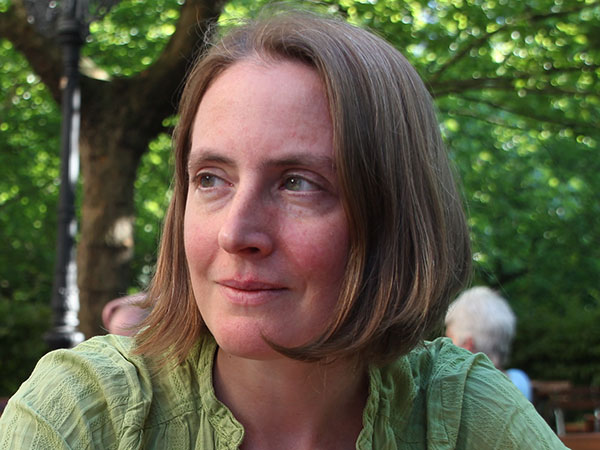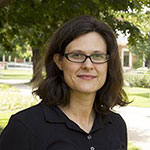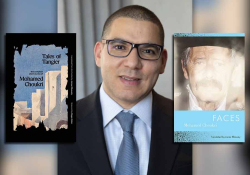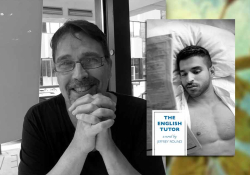Coming of Age in a Timeless Era: An Interview with Isabel Fargo Cole

In October 2015 Two Lines Press will publish The Sleep of the Righteous, Isabel Fargo Cole’s translation of Der Schlaf der Gerechten, by Wolfgang Hilbig. Having vacillated between East and West Germany during the course of his lifetime, Hilbig gained much respect for his work by writers such as László Krasznahorkai, a writer of Hungarian origin. Cole’s English translation will introduce Der Schlaf der Gerechten to an English readership. Here Cole discusses Hilbig’s writing and what it means to translate the timeless into American English. [Her translation of “Coming,” a story from the collection, is available on the WLT website.]
Andrea Bryant: You have translated authors as diverse as Annemarie Schwarzenbach, a Swiss writer, and Hermann Ungar, a writer born in Prague. What brought you to Hilbig’s work?
Isabel Fargo Cole: In 1987 I spent a few days in Berlin, and the city took hold of me—especially the idea of that other world behind the Wall. After college, in 1995, I moved to Berlin and studied at the Humboldt University in the former East, quickly ending up with an East German circle of friends. I spent most of my time in kitchen-table discussions, exploring the city, discovering German writers, and trying to feel my way into the past that still seems very present in Berlin. I discovered Hilbig’s work through a friend, and paradoxically it gave me a vivid sense of the past in a way that more accessible writing didn’t—precisely because of its dreamlike quality that seems to suspend time, and its great sensual immediacy.
AB: Do you find any similarities between the work of Hilbig and that of Franz Fühmann, another East German writer whose work you have translated?
IFC: Fühmann was an important establishment writer who championed young, nonconformist colleagues, and Hilbig is his best-known protégé. Fühmann was keenly interested in Romantic and “decadent” literature that departs from straight realism, experiments with form, and explores the dark and irrational sides of human nature—all that was taboo in socialist literature. For him, Hilbig was a kindred spirit and the genius that GDR literature had been waiting for; to his great disappointment, he only managed to get one of Hilbig’s books published in the GDR. Stylistically, the two writers are quite different: Fühmann writes an idiosyncratic but polished and classically structured German, while Hilbig, a generation younger, uses more experimental, fragmented language that can be intentionally rough. He respected Fühmann but was not influenced by him.
AB: Perusing Hilbig’s original text of Der Schlaf der Gerechten, I couldn’t help but notice that at times the sentences stretched for a paragraph, connected by a series of commas and/or dashes, while at other times the sentences were more abrupt. How were you able to accommodate for this varying sentence structure when translating into American English?
I aimed to retain Hilbig’s syntax and punctuation as much as possible, for one thing because it is also idiosyncratic in German. It has a fragmented quality; the narrator’s voice jumps around or wanders into a labyrinth it can’t find its way out of.
IFC: I aimed to retain Hilbig’s syntax and punctuation as much as possible, for one thing because it is also idiosyncratic in German. It has a fragmented quality; the narrator’s voice jumps around or wanders into a labyrinth it can’t find its way out of. Or, in many sentences, images and sensations accumulate and tension builds, and readers aren’t given a chance to catch their breath. These effects are crucial to the narrative voice. And of course an author alternates long sprawling sentences with short abrupt ones for reasons of rhythm and emphasis. I did break up some of the sentences when possible to do so without disrupting the rhythm or introducing a different logic. German has more tolerance for, say, using several colons in the same sentence, along with dashes and semicolons, so I felt I had to tone this down in English. On the other hand, I preserved one exotic bit of punctuation: the use of dashes to connect (or set off) separate sentences. It’s not uncommon among German writers of that generation, an almost physical gesture that adds a subliminal emphasis. I think it’s an interesting device and worth introducing into English.
AB: Is the way you sustain sentence structure and length unique to your translation of Hilbig’s work, or does this awareness extend to other authors when translating?
IFC: I always try to figure out the intended effect of the syntax, what the logic is, where the emphasis lies, how the build-up works, and transport that. Some restructuring is always necessary simply because English works differently than German; the emphasis can fall differently, or certain constructions require so much unpacking in English that the logic and/or rhythm would be lost. But my strategy is different each time. Fühmann’s short-story cycle The Jew Car plays with long, “cascading” sentences punctuated by short ones. I knew the long sentences were important to Fühmann because he was furious when his own editor broke them up, and I realized how crucial they are to the narrative voice. And they are quite linear, so they remain easy to follow. However, in his later essay, At the Burning Abyss, which I’m translating now, he uses long sentences that are more complex, with “typically German” nested clauses. Since this work deals with very complex ideas as it is, I am taking the strategy of breaking up the sentences somewhat to help the reader follow along. By contrast, the structure of Hilbig’s sentences is actually less “Germanic” and more linear—it is a linearity that often meanders and spirals and dissolves, but all these syntactic effects transfer fairly directly into English.
AB: In “Coming,” a story which is part of the larger collection, the narrator undergoes a series of revelations related to what he heard while living in a timeworn house in East Germany. What influence would you say the auditory has on the narrator in this story overall, and how significant was this experience for him?
IFC: It’s interesting; I hadn’t really thought about the auditory aspect as such. Now that I think of it, the narrators in this collection are often haunted by sounds or voices—the ghostly footsteps in “The Afternoon,” the mysterious phone calls in “The Dark Man,” the men muttering in their sleep in the title story, the word cholera in “The Memories.” . . . This is one of the uncanny, gothic elements of Hilbig’s prose. In “Coming,” the narrator feels that these sounds and voices have a message for him that he can’t fathom. Banal human utterances acquire a tremendous significance; at the same time, human communication has completely broken down. The narrator in “Coming” is haunted by the women’s voices yet is unable to respond to them and express his love—other than by a crude physical act.
AB: So much of “Coming” revolves around interacting with nature, such as a lake and a heavy rain. In what way does this relationship change or develop throughout the story? Does this interaction carry over throughout all of Der Schlaf der Gerechten?
IFC: Nature is central to Hilbig’s work, beautiful and threatening, mysterious and encroaching. It is being ravaged by strip mines and factories; at the same time, everything seems to be decaying back into a state of nature. In the tradition of Romantic/gothic writing, natural phenomena almost have a kind of personhood; they reflect the narrator’s psyche while also confronting him as something alien and seductive. This is also seen in “The Place of Storms” and “The Bottles in the Cellar,” but the literal climax of this tension occurs in “Coming”; the narrator escapes the women by fleeing to a lonely lake, where the intense physical encounter with nature culminates in his first orgasm.
AB: Which element would you say has the stronger hold over the narrator in “Coming,” the auditory or the natural? Why do you think that is?
IFC: I wouldn’t draw a strict distinction between “the auditory” and “the natural” in Hilbig’s work, where nature often speaks with almost human voices. The narrator of “Coming” goes to the lake to flee the women’s voices, but there everything is stirring, the reeds are “moaning and sighing.” These voices merge together, which perhaps is why the pond becomes so erotically charged. Perhaps, by succumbing to the seduction of the lake’s voices, the narrator has cut himself off from women forever; after his orgasm he ceases to hear their voices. On the other hand, the narrator has followed the women’s force of suggestion, doing exactly what they keep shrieking about (but don’t actually do): he has gone into the lake. Where both sex and death await. So there is a complex interplay of forces here, and many different ways to read them.
AB: Up until now we have been mainly discussing your translation of “Coming,” an excerpt in your soon-to-be-released translation. How does this story fit into the overall structure of the book?
IFC: All the stories in this collection are mainly set in Hilbig’s hometown of Meuselwitz, a coal-mining and industrial town in Thuringia, and stick closely to his biography. The stories in part 1 (including “Coming”) center around childhood experiences, while those in part 2 involve an adult narrator returning to his hometown probably at some point in the 1990s. “Coming” marks the dawning of the narrator’s sexuality and foreshadows the troubled relationship with women that is central to the final novella, “The Dark Man.”
AB: Which narrative in the story do you feel is most representative of Hilbig’s work, and is this one also your favorite?
IFC: Hilbig revisited the same (autobiographical) themes again and again, and this last collection is a kind of summation. It also shows his range. My favorite story, “The Bottles in the Cellar,” is in his more lyrical vein; you could call it “dark pastoral.” By contrast, “The Dark Man” is a long novella that shows his more explicitly political side: complementing his novel “I,” which explores the Stasi from the perspective of the perpetrators. This shows the victims’ perspective and does so in a stylistic vein that I think of as his “urban noir.”
AB: Hailing from Meuselwitz and working initially in a factory making tools, Hilbig must have been influenced by his early day-to-day existence in East Germany. In what ways can one notice this when reading his later works, such as The Sleep of the Righteous?
In “The Memories,” we also see Hilbig’s lonely adult existence as a factory stoker who wrote poetry during his breaks, and in “The Afternoon” and “The Dark Man” he revisits the trauma of Stasi surveillance and persecution; he himself spent several weeks in Stasi prison, where he resisted attempts at recruitment.
IFC: This collection is one of his most autobiographical works. Hilbig was very much shaped by the aftermath of the war, the lack of a father (missing at Stalingrad), the female-dominated household, and his Polish grandfather; all these things are explored here. In “The Memories,” we also see his lonely adult existence as a factory stoker who wrote poetry during his breaks, and in “The Afternoon” and “The Dark Man” he revisits the trauma of Stasi surveillance and persecution; he himself spent several weeks in Stasi prison, where he resisted attempts at recruitment. And the setting is very true to life. His friend Lutz Kornel-Nitzsche once showed me around Meuselwitz: the mine pits, the forest, the former forced-labor camp, the ruined factories, the stopped clock at the train station. On the other hand, it’s a prettier town than Hilbig makes it out to be, with a beautiful eighteenth-century palace and gardens frequented by Voltaire—something I don’t think Hilbig ever described or mentioned.
AB: I keep thinking about the different ways in which migrating from East to West Germany influenced Hilbig’s work. Many interpret his work as inherently stemming from Hilbig’s experiences of leading a duplicate existence. Does this duality appear in The Sleep of the Righteous or is this interpretation too simplistic an explanation? Can one find the same in “I”?
IFC: This duality is an aspect of his biography that he himself explored, and it’s very clear in the structure of this collection. In part 1 the perspective is deeply embedded in the GDR, while the ones in part 2 are clearly post–1989, with the narrator returning to his childhood home, registering changes (mostly a sense of the community dying out), reflecting on ghosts of the past. Crucially, Hilbig’s narrators are profoundly alienated in the GDR, but it is not an alienation that the West can solve. The West is merely attractive as a place to escape to. The narrator of “I,” a Stasi spy, dreams of being sent on a mission to the West, but only as a chance to escape his botched life and reinvent himself.
In 1985 the East German authorities gave Hilbig a one-year travel visa so that he could accept a residency in West Germany. When the year was over, he simply stayed there. In his novel Das Provisorium (2000), he described this passivity and indecision: he felt at home in neither world. The West was where he could officially live as a writer, but the GDR retained a much stronger hold on him—and his writing. In “The Dark Man,” he reflects on his “exile” in the affluent wine-growing Palatinate: “It was, in my view, one of the most beautiful regions in Germany, and so far it had appeared in not a single work I’d written. Though I’d lived here for several years, I wrote on and on about the moonscapes south of Leipzig.” In a way, Hilbig’s GDR resembles the Yoknapatawpha County of William Faulkner, whom he admired: as he revisits and revisits these moonscapes, they prove to be an entire universe without spatial or temporal boundaries. By contrast, the Western world seems shallow to him.
In a way, Hilbig’s GDR resembles the Yoknapatawpha County of William Faulkner, whom he admired: as he revisits and revisits these moonscapes, they prove to be an entire universe without spatial or temporal boundaries. By contrast, the Western world seems shallow to him.
AB: Although he had such humble beginnings, Hilbig later amassed much respect for his work, even winning the prestigious Georg-Büchner Prize in 2002. Was he read in the GDR?
IFC: In the GDR, factory workers like Hilbig were actively encouraged to write, in an attempt to foster a genuine working-class literature. There were official writing groups, one of which he joined, but his work was too dark and obscure, and he was expelled. After that he joined underground literary circles in Leipzig and Berlin, where he was highly regarded, but like all these writers he had great difficulty publishing in the GDR. From 1979 onward his work was published in West Germany to great critical acclaim, which helped him become better known in the East as well.
AB: Although his work did not gain ready acceptance at first in the GDR (he was fined for the 1979 West German publication of his initial poetry collection, Absence), The Sleep of the Righteous includes an introduction written by László Krasznahorkai, a writer from Hungary. How is this wide acceptance paralleled in the former East Germany after 1989?
IFC: In Berlin literary circles most people know and admire him, but I’ve been told that he is still far better known in Eastern than in Western Germany. As noted above, he wrote about the GDR all his life, and in Western Germany there is still a widespread reluctance to engage with East German perspectives. He does have far-flung admirers, like the Austrian writer Klaus Hoffer, whom I’ve also translated, and has been translated widely into European languages. But it is mainly the Eastern German literary community, and Western writers and critics of his generation, who revere him. And he is a powerful influence for some younger writers like Leipzig-based Clemens Meyer.
AB: What compelled you to translate this work? Do you think you will continue to translate works such as this one?
IFC: This project came about while I was translating “I” for Seagull. Two Lines had published “The Bottles in the Cellar” in their magazine and asked me to recommend a Hilbig book for publication, if Seagull would agree, which they did. I suggested this story collection in part because it shows a different part of Hilbig’s range: his lyricism, his nature imagery, the world of his childhood with the shadow of World War II, and the post–1989 perspective.
AB: You mentioned that your favorite story in The Sleep of the Righteous is “The Bottles in the Cellar,” with its dark but pastoral ambience. What was your experience of reading and translating this work?
IFC: “The Bottles in the Cellar” might be the very first thing I read of his, and it has never lost its intensity for me—the rhythm, the sinister beauty and aliveness of everything, glowing and crackling, the inexorability of the fruit ripening until it begins to “flow of its own accord.” It’s about the alcoholism that plagued him; it’s both sobering and intoxicating. And though it was certainly not easy to translate, each time I sat down to work on it, the intoxication would set in and carry me through. I could say the same about his work in general, but it was especially true of this story.
AB: Do you think you will continue to translate works by Hilbig?
IFC: I certainly hope so! I would like to continue translating him and Fühmann; they are two of the most fascinating figures in modern German letters, an almost untapped vein of literature with incredible richness and power.
AB: In December 2013 you helped begin Writers Against Mass Surveillance. Was this affected by your work as a translator of Hilbig’s work?
IFC: The issue of surveillance has preoccupied me for a long time—it’s a crucial political/social issue, and I was glad to have the opportunity to take action on it. On the other hand, it has complex and elusive implications that can get lost in a purely political debate. Works like “I” or the story “The Dark Man” offer subtle but profound insights into mechanisms of surveillance, often implicating the reader (and writer) in a thought-provoking fashion. They have accompanied me over the past twenty years through debates on the Stasi, the NSA, and the Stasi vs. the NSA; I was finishing my translation of “I” as the NSA scandal broke. Precisely because Hilbig doesn’t have a simple “message,” his work has helped me find new perspectives and maintain my intellectual interest in the issue. Even a statement like that sounds too reductive, though. Let’s just say that lots of things feed into each other.
July 2015
Isabel Fargo Cole’s translation of Wolfgang Hilbig’s Der Schlaf der Gerechten (Two Lines Press) is forthcoming in October 2015. Other translations include Klaus Hoffer’s Among the Bieresch (forthcoming); All the Roads are Open, by Annemarie Schwarzenbach; The Jew Car, by Franz Fühmann; Collected Essays, by Friedrich Dürrenmatt; and “I,” by Wolfgang Hilbig (all with Seagull Books). She also edits the online translation journal at no man’s land.















